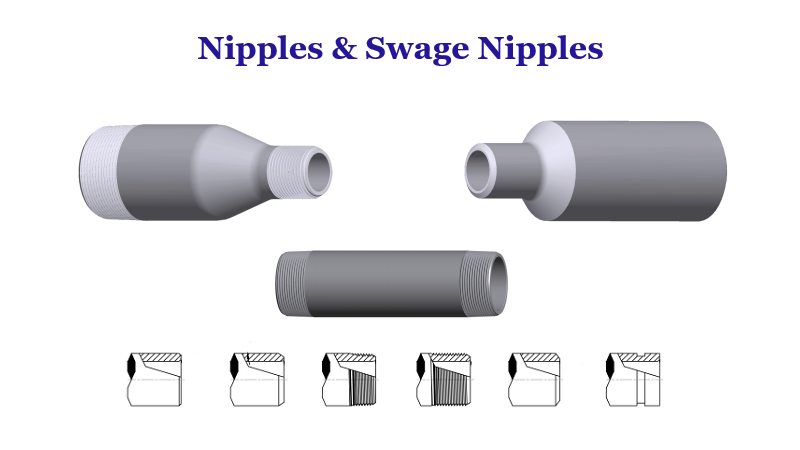Understanding Pipe Fitting Connection Types: Threaded, Flanged, Butt Weld, Socket Weld, Grooved, and Press Fit


In industrial piping, the way you connect your pipes matters as much as the pipes themselves.
The right connection type affects installation speed, leak prevention, system strength, and long-term maintenance costs.
Whether you’re designing a new system, upgrading old lines, or performing routine maintenance, understanding connection types is essential for making the right choice. This guide covers the six most widely used connection types in piping: Threaded, Flanged, Butt Weld, Socket Weld, Grooved, and Press Fit.
1. Threaded Connections — Simple & Cost-Effective for Small Systems
What They Are:
Machined male and female threads join two pipe ends. Common thread standards: NPT, BSPT, BSPP.
Best For:
-
Low to medium pressure
-
Small diameter (≤ 4”)
-
Plumbing, air, and fire sprinkler lines
Pros:
-
No welding required — simple tools only
-
Easy to disassemble and replace parts
-
Low cost for small systems
Cons:
-
Threads can leak — needs sealant
-
Can loosen in vibration
-
Limited to small sizes
2. Flanged Connections — Heavy-Duty & Accessible for Maintenance
What They Are:
Bolted flanges with a gasket create a leak-tight seal. Built to standards like ASME B16.5 and EN 1092.
Best For:
-
High pressure/temperature
-
Large diameters
-
Oil & gas, chemical, water treatment
Pros:
-
Easy to open for inspection
-
Handles demanding service
-
Standardized dimensions
Cons:
-
Heavier and bulkier
-
Higher cost and labor
-
Requires correct bolt torque
3. Butt Weld Connections — Strong, Permanent, and Smooth
What They Are:
Two beveled pipe ends are welded for a permanent, flush interior bore.
Best For:
-
Extreme pressure/temperature
-
Long-run pipelines
-
Power, refining, chemical plants
Pros:
-
Very strong, leak-resistant
-
Smooth flow with minimal turbulence
-
Excellent for critical service
Cons:
-
Needs skilled welders & inspection
-
Time-consuming
-
Hard to modify later
4. Socket Weld Connections — High-Pressure Small-Bore Solution
What They Are:
A pipe is inserted into a socket in the fitting, then fillet-welded at the joint.
Best For:
-
≤ 2” diameter
-
Steam, hydraulics, and chemical lines
Pros:
-
Stronger than threading
-
Simple alignment
-
Good for vibration resistance
Cons:
-
Can trap fluid → crevice corrosion risk
-
Not suitable for toxic fluids
-
Not easily radiographed
5. Grooved Connections — Fast & Flexible Mechanical Coupling
What They Are:
A groove is rolled or cut near the pipe end; a gasketed coupling clamps around it.
Best For:
-
Fire protection
-
HVAC water lines
-
Mining, industrial water
Pros:
-
Very fast installation
-
Allows movement & vibration absorption
-
Easy maintenance
Cons:
-
Requires grooving tools
-
Lower pressure ratings than welding
-
Couplings can be costly for small jobs
6. Press Fit Connections — Clean, Quick, and Tool-Based
What They Are:
Fittings with internal seals are hydraulically pressed onto the pipe.
Best For:
-
Water, heating, cooling
-
Compressed air
-
Light industrial service
Pros:
-
No hot work permits — safe in occupied buildings
-
Consistent, reliable joints
-
Rapid installation
Cons:
-
Requires proprietary press tools
-
Seal degradation possible
-
Limited for extreme service
Comparison Table — At a Glance
| Connection Type | Size Range | Pressure Rating | Installation Speed | Maintenance Access | Common Applications |
|---|---|---|---|---|---|
| Threaded | ≤ 4” | Low-Medium | Fast | Easy | Plumbing, air lines |
| Flanged | All sizes | High | Moderate | Excellent | Process piping |
| Butt Weld | All sizes | Very High | Slow | Poor | Critical service |
| Socket Weld | ≤ 2” | High | Moderate | Poor | Steam, hydraulics |
| Grooved | All sizes | Medium | Very Fast | Excellent | Fire protection |
| Press Fit | ≤ 4” | Low-Medium | Very Fast | Good | HVAC, potable water |
Key Takeaways
-
Threaded: Best for small, low-cost, low-pressure systems.
-
Flanged: Strong and serviceable for large, high-pressure lines.
-
Butt Weld: Permanent, smooth, and ideal for critical operations.
-
Socket Weld: Strong small-bore option for high-pressure service.
-
Grooved: Fast and flexible, great for systems needing movement.
-
Press Fit: Clean, safe, and fast for light-to-medium-duty lines.
If you need technical support, specifications, or product sourcing for any of these connection types, Hayward Pipe & Supply can supply top-quality fittings, flanges, and joining systems from leading manufacturers — all backed by expert guidance.
Call us today (510) 887-2700 or visit www.haywardpipe.com to request a quote.

